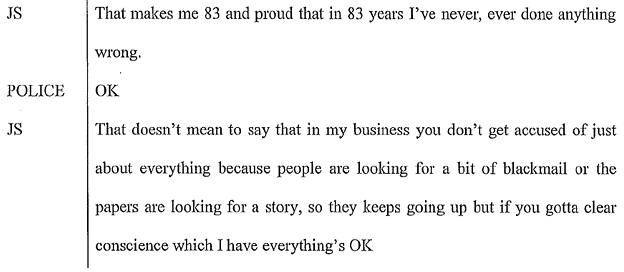Could new guidelines have stopped Savile?
- Published
Prosecutors have published detailed guidance on how to handle sex abuse allegations in the same week as Surrey police released transcripts of an interview with Jimmy Savile.
The new guidance comes down to a simple shift in thinking that can make a profound difference: trust, rather than doubt, what the victim is saying.
But would it have made a difference in the Savile scandal? Between 2007 and 2009 Surrey Police investigated allegations of sexual abuse by Savile at the Duncroft Approved School in Surrey.
Police eventually interviewed him at his office at Stoke Mandeville Hospital , externalin which they put the allegations to him.
His first reaction was to deny anything and to blame the victims.

The evidence against Savile had come to the police slowly and, despite the misgivings of prosecutors, the detectives had pursued early leads and found other possible victims or witnesses.
There was nothing to suggest the three victims who made allegations against Savile had colluded or were unreliable.
The CPS's own review of this decision concluded that "police and prosecutors treated claims with a degree of caution which was neither justified nor required".
The new guidance stresses that prosecutors should focus on the credibility of the allegation, rather than perceived weaknesses in the victim.

Savile wasn't nationally famous in the 1950s - so why would he have faced some kind of conspiracy all those years ago? Was this flippant exaggeration or a signal that he had created a script and backstory to cover up decades of offences?
The new guidance urges police and prosecutors to look for and assess intelligence of suspicious behaviour down the years, such as signs that an offender selects and abuses each victim for a short period before moving on to someone else in another location.

This is a classic tactic of shifting the focus of suspicion onto the victim. Duncroft educated troubled girls - and Savile's message was that troubled girls can't be trusted.
Many sex abuse cases have failed because of a reluctance by police and prosecutors to put victims from troubled backgrounds before a jury.
The new guidance warns police and prosecutors not to fall into the trap of believing myths about some victims. It says don't dismiss a complaint just because a victim has a troubled background.
Secondly, it tells police and prosecutors to ensure that the victim has been given appropriate outside help, such as therapy or other support. The charity Victim Support says that this kind of support is critical in helping the victim to cope from the earliest stage with preparing to give evidence at trial.
The recent Old Bailey trial of men who ran a massive street grooming and sex trafficking ring in Oxford demonstrated beyond doubt that juries will believe these kinds of victims if the prosecution case is properly prepared and presented - and the victims have been supported to tell their stories.

That's a straight denial to a straight question - his word against theirs. But other evidence can be found. Offenders who abuse are likely to also have images of abuse on a home computer or elsewhere. The new guidance says detectives should go looking for those kinds of abuse images as soon as possible.

The oddest section of the interview is when Savile starts bragging about his influence and power in law and the police. But his tactics aside, the guidance says that forces need to share information properly with themselves and other agencies - and here is a specific hint that there are other forces know about allegations made against him.
In the case of Savile, the modern expectations would be for the forces who each knew a piece of the picture to have properly shared that information with others. Crucially, if that intelligence leads to victims - then they ultimately should be told about each other because it could help them to find the courage to give evidence.
So could these new rules have uncovered and stopped Jimmy Savile's offending?
The answer is yes, because the CPS has already conceded that he could have been charged, external, had prosecutors and the police "taken a different approach". It may still have been very difficult to get a case into court - but down the years the opportunities were there.